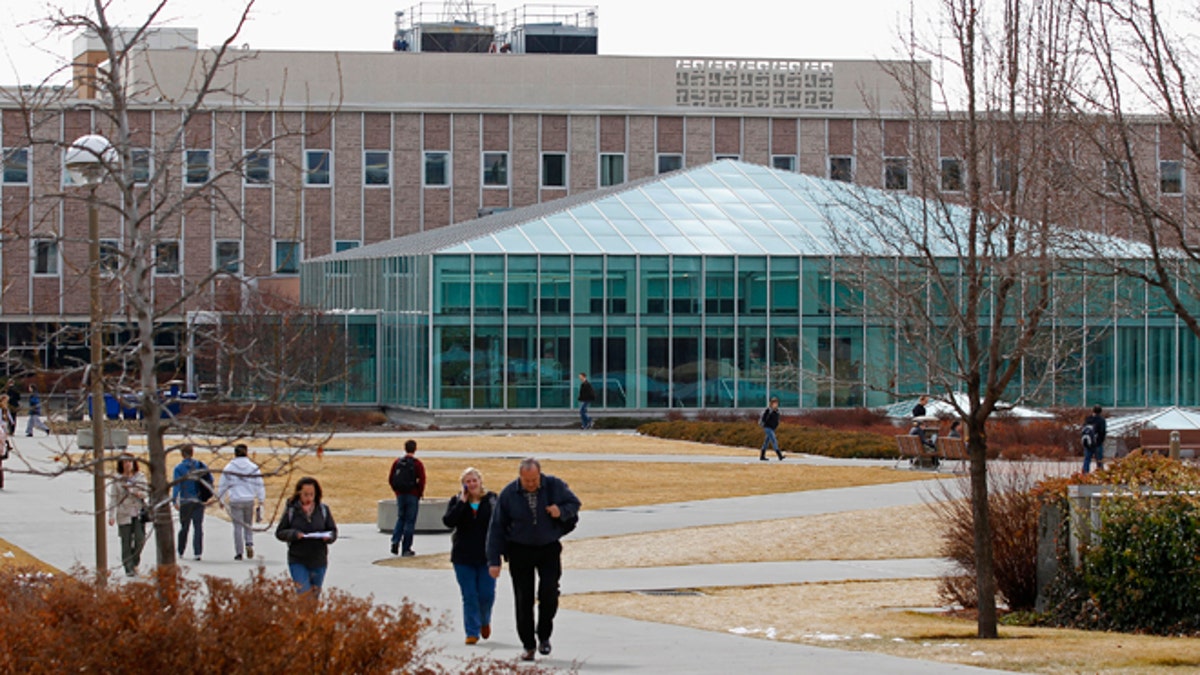
Feb. 16, 2012: People walk by the Harold B. Lee Library on the campus of Brigham Young University (BYU) in Provo. (Reuters)
Tying the knot is the last thing on most college students’ minds but at Brigham Young University one quarter of the student population is married.
Justin Hales and Camille Mabey met in an undergraduate statistics class at BYU, a private university in Provo, Utah owned and operated by The Church of Jesus Christ of Latter-day Saints. She was a sophomore at the time and he was a junior.
After a year-long courtship, the pair said “I do” last May 4 and are now finishing school together. Hales describes BYU as conducive to marriage, since 98 percent of the university’s 34,000 students are Mormon and share life goals.
Dating and marriage play a significant role in the social culture at BYU. Bridal guides are stacked next to the campus newspaper in common areas, a “Preparation for Marriage” course is offered through the School of Family Life and on-campus housing is available for married student couples.
“It’s kind of a unique opportunity to find someone who you’re interested in building a future life with,” Hales said of the BYU experience. “A lot of students have the mindset of taking advantage of that opportunity while they’re here rather than waiting until they’re somewhere else and don’t have as many similar people around them.”
On a national scale, couples like Hales and Mabey are an anomaly. According to the Knot Yet Report, a recent study exploring marriage trends authored by BYU assistant professor Dr. Brian Willoughby, the average age of first marriage in the United States has reached an all-time high (27 for women, 29 for men) and the overall rate of marriage has dropped to an all-time low.
At the same time, a recent Facebook Data Science study found that religious colleges make up a significant portion of the top 25 colleges with married students, including BYU. There are exceptions, such as the non-religious undergraduate engineering school Rose-Hulman Institute of Technology, where 70 percent of female graduates met their spouse at college.
Willoughby said one of the most interesting finding of his study was that while couples who marry in their early 20s have a higher likelihood of divorce thanthose who marry later, couples who marry younger ultimately have higher satisfaction and quality in their relationships.
“The takeaway message that we found was not when the best age might be to get married, but that there might be some potential concern if the trends we’re seeing continue,” Willoughby said. “If people continue to get married in their late 20s and even early 30s, there is a potential risk factor in terms of relationship quality.”
According to Willoughby, the biggest challenge for couples who marry in college is figuring out how to mesh their individual aspirations into a life plan that works for both. Balancing different graduation dates, job offers in various cities and plans for graduate school can be difficult and requires compromise.
Married BYU students Zoya and Daniel Draper met in a political science class and were initially attracted to each other because of their similar interests and goals.
“It’s different when you get married because you have to fuse two different dreams together,” Zoya said. “I think figuring out how you’re going to make it work is part of the process and easier to do when you’re younger. By the time you’re 28 or 30 you have a set plan and daily routine so it’s harder to throw someone else into the mix. When you get married younger, you can develop those routines together.”
“It’s a great opportunity before you have careers and before you’re financially stable to have a vision and create a life together,” Daniel added.
This past March, Princeton alumna Susan Patton wrote an open letter to the on-campus independent newspaper The Daily Princetonian, in which she advised Princeton students to search for their spouses while at university. Her comments met with a severe backlash on a national level.
Princeton senior Kristina Ali said she felt Patton’s remarks were out of touch and inconsistent with the goals and aspirations of most Princeton students and college undergraduates in general.
“I have friends who want to be doctors, lawyers, teachers and bankers, so, like myself; we are all focused on starting a career or continuing our education after graduation. Marriage is not something we discuss.” Ali said. “Marriage is something that I hope to have at some point in my life, but as of right now, as a college senior, it is not something that I prioritize above graduating and going to medical school.”
But according to the Hales, it can be nice to have a partner through all the challenges most 20-somethings face on their own.
“When Camille and I first got married, we hadn’t accomplished much individually,” Hales said. “But instead of choosing the route of going it on our own and achieving success solo, we felt that together our chances would be better if we worked as a team and had each other along the way.”









































